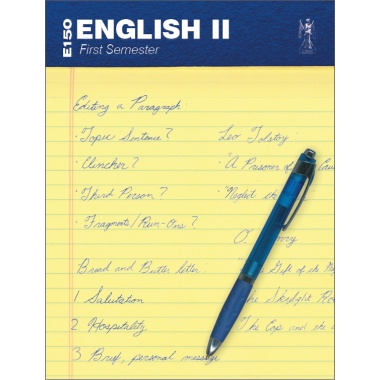Landmark's Freedom Baptist Curriculum (LFBC) offers comprehensive English courses for grades nine through twelve that include grammar, usage, spelling, vocabulary, composition skills, and literature. Each year, students will also write a research paper. Students taking these courses need to be self-directed and should already have decent composition skills.
Each course has two student worktexts, one answer key for the two worktexts, a Tests and Quizzes book, the answer key for the tests and quizzes, and from one to three literature books. A small English Handbook is available free upon request. Although courses are designed for independent study, a parent needs to check student work and administer quizzes and tests.
The student workbooks include lines at the end of each week's lessons where the parent or teacher is to sign off that they have checked the student's work and give approval for the student to take the week's quiz or one of the quarterly tests. Some composition assignments have specific lines for students to turn in work and have it signed off. In other cases, parents need to read closely before signing off on a week's work to ensure that students have turned in all composition assignments. There are no rubrics or tools to assist parents in evaluating compositions or research papers. You might find the free article "HOWTO: 3 Easy Steps to Grading Student Essays" helpful.
Quizzes and tests require a parent or responsible person to dictate spelling words. Some short essay questions are included on some quizzes and tests. Key points that should be included in those essay responses are in the answer key.
Students read short stories or novels for these courses, and these are included with the course books. For ninth grade, they will read 20,000 Leagues Under the Sea. Tenth graders have two books, The Collected Short Stories of Leo Tolstoy and The Collected Short Stories of O. Henry. For eleventh grade, the books are The Scarlet Letter and Robinson Crusoe. Twelve graders read three books: The Pilgrim's Progress, In His Steps, and Pride and Prejudice. Students answer questions regarding these books within their worktexts. To make it easier for teachers or parents to grade daily work, the worktext questions tend to be at the comprehension and understanding levels so that answers are predictable. Essay questions on quizzes and tests sometimes push students into deeper thinking. Parents who have the time might want to challenge students with a deeper discussion of some of the reading material.
These English courses will probably be most useful in situations where parents have very limited time to be involved with teaching, but parents can be assured that students will be exposed to character-building material that is supportive of Christian values.









